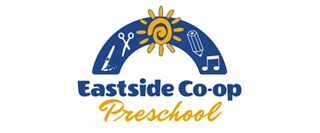

About Our Classes
ECP offers three classes for children ages 2-5. Each class is 2 1/2 hours and meets in our classroom at 1775 Yew Ave NE in Olympia. The preschool year begins in mid-September and ends in June. School holidays and inclement weather closings loosely follow the Olympia School District holiday schedule.
Example of Curriculum
Discovery Time:
Students are greeted by the teacher and parent helpers as they arrive. Once children get settled, they can participate in a number of activities. The dramatic play area, story loft, science table, and art area are always open. In addition, the teacher offers other choices specific to the day's lessons, i.e., painting with apples, making apple sauce, and playing with play dough. Though the children are free to make their own choices, this isn't a free-for-all time. The activities are set up to encourage social interaction, positive behavior, cooperation, and problem-solving skills.
Clean-up Time:
Lively music makes clean-up fun and helps children transition to the next activity.
Circle Time:
The children and parent helpers gather inside or outside (weather permitting) for age-appropriate songs, stories, creative movement, and sharing. In the older classes, children are asked to bring something for show and tell that has specific properties, i.e., flexible, transparent, fragrant, etc.
Outside Time:
A time for running, jumping, riding bicycles, climbing play structures, playing in the dollhouse, or playing with sand or water. It's an opportunity to be very noisy while exploring nature. Sometimes, the classes might take a supervised walk through the trail along the property line.
Snack Time:
Eating snack is a chance to practice social skills while learning about nutrition, science, and hygiene. Children often help their parents prepare snack.
Story Time or Other Small Group Activity:
The teacher or parent helper will read stories in the loft. Children who choose not to participate often work on quiet activities (coloring, dramatic play area) with the other parent helper. Sometimes, the teacher may set out a second discovery time session with items specific to the month's theme or day's lesson, i.e., make height and weight charts, hunt for bugs, experiment with levers and pulleys, or make pancakes.
Outside Time: One last chance to get their energy out before being picked up!
Red Class
For children 2 years old or older by August 31. Class meets from 9:15-11:45 a.m. on Tuesdays and Thursdays. Class size: 9 children. Adults in classroom: 1 teacher, 3 parent helpers. Children do not need to be toilet trained.
Yellow Class
For children 3 years old or older by August 31. Class meets from 9:15-11:45 p.m. on Mondays, Wednesdays, and Fridays. Class size: 11 children. Adults in classroom: 1 teacher, 2 parent helpers. Children do not need to be toilet trained.
Blue Class
For children 4 years old or older by August 31. Class meets from 12:45-3:15 p.m. on Mondays, Wednesdays, and Fridays. Class size: 12 children. Adults in classroom: 1 teacher, 2 parent helpers. Children do not need to be toilet trained.
Field Trips and Guest Speakers
Class field trips vary depending upon the age of the class and parent availability. In general, the classes take trips to the pumpkin patch, the McKinney salmon run (older classes), bakery, post office, fire station, dentist, the annual Olympia Arts Walk, farmer's market, and children's museums.
Teachers often invite guest speakers and parents to share their experiences or talents with the classes. In years past, children have had visits from firefighters, tooth fairies, theater groups, musicians, veterinarians, chefs -- just about any talent or special interest parents and community members are willing to share with our children.
Siblings are sometimes allowed on class field trips, depending upon the venue and focus of the trip. A trip to the pumpkin patch would be open to siblings. A trip to the bakery would likely not include siblings (usually at the bakery's request) because of the size of the group.
Classes also get together on non-school days for special events, such as children's plays, playgroups, birthday parties, train rides, or park trips. While these events are voluntary and not associated with the preschool, we do encourage families to gather for play time outside school.